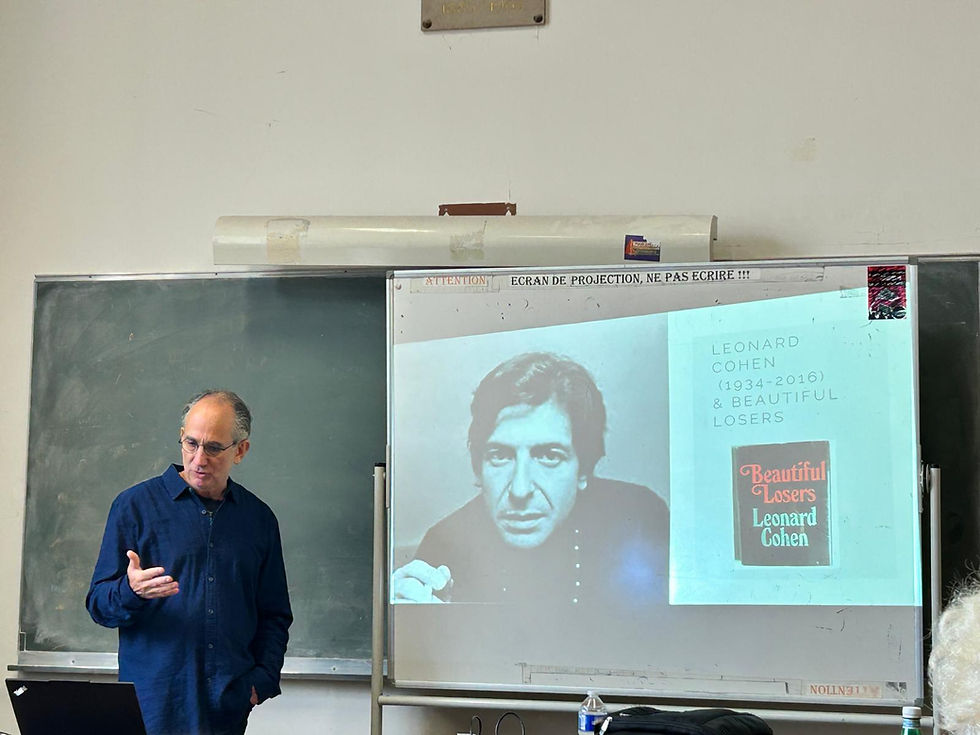Dreaming in Alexandria: a Psychoanalytical Study of Dreams in The Alexandria Quartet
- Rony Alfandary
- Oct 18, 2020
- 4 min read

This is the English Abstract of an essay published in Hebrew at MA'ARAG, The Israeli Annuals of Psychoanalysis in 2012
This inter-disciplinary essay study of Lawrence Durrell (1912-1990) The Alexandria Quartet (1958-1960), will demonstrate the ways in which the author relied and was inspired by Freudian notions of the dream and dream-work as understood by him.
Lawrence Durrell was an avid reader of Freud and his fictional work is saturated with explicit and implicit reference to Freudian ideas. In this tetralogy, Durrell used the concept of the dream as a topographical construct to demonstrate his claim that the human psyche is governed by transcendental forces. Durrell uses various narrative techniques to echo his claim of the multi-layered voice of the author-protagonist, thus re-vibrating and introducing complex notions regarding the cohesiveness of the human self and its authority.

The Alexandria Quartet was Durrell's claim to fame. When published in the early Sixties, it brought him world critical and financial acclaim, including a nomination to the Nobel Prize for Literature. The success of the tetralogy brought translations to numerous languages (sadly, only the first two volumes were translated to Hebrew so far). The Alexandria Quartet, despite its declining popularity, is still a shining example to the way Freudian thought informed and inspired creative writing during mid-20th Century as well as being informed by the earlier tradition of the Bildungsroman .
The writing of The Alexandria Quartet was more than "just" telling a complex, multi-layered story. Having suffered himself a separation from his family and homeland at the age of 12, Durrell establishes the field of writing as the place where he can find, create and recreate a sense of belonging absent from his personal life. In this sense, The Alexandria Quartet is Durrell's attempt to reestablish himself as an autonomous and discreet subject, and yet to acknowledge that being a subject infers being related to, and even controlled by, forces beyond his conscious grasp. Thus, dreams and dream-work seem the perfect media for the author to try and exercise his attempt to come to terms with the sense of existential bewilderment and estrangement which has been a driving force in his life. Through the act of writing, he attempts to transform his injury into art.
The essay shows how Durrell uses different readings of the same textual circumstances to show that the notion of Truth is reliant upon the perspective from which it is viewed and told. The structure of the novel is based upon the idea that Truth is a construct based upon unconscious notions.

In addition to demonstrating the way concepts of dream and dream work construct the novel, this study also shows how Durrell uses particular dreams to bring forth the prominent themes of the novel. In the analysis of two major dreams, this study shows how ideas about sexuality plays a major role in the novel. But Durrell is not content to adopt the Freudian notion of the centrality of sexuality in explaining human motivation. Based upon his own experience as an employee of the British Foreign Office during the Forties and Fifties, he constructs a narrative which uses actual political events in Egypt and Palestine in that period, to portray the individual, again, as a pawn in a game whose rules seem to be arbitrary.
The interpretation of the two dreams show the intricate relation between form and content of the dreams but also address the issue of the authorship of the work. Both dreams serve to communicate to the reader what the author figure is supposedly unaware of. Thus, Durrell makes an important statement regarding the question as to who is the author of the text. Which of the many author figures appearing in the work is "responsible" for the text and its veracity? Can anyone make such a claim? Durrell states his position quite subtly. Due to his own ambivalence towards Freud, which in turn can be interpreted as ambivalence towards his own father, he veers away from simplistic and reductive conclusion. The question of the authorship, as well as the question of Truth, remains unresolved on purpose. It is up to the reader to make up their own minds as to what was the "real" story underlying the labyrinthine plots and sub-plots he describes in the beautiful though biased view of pre- WW2 Alexandria.
Beyond the question of truth, The Alexandria Quartet, and its abundance of references to the workings of the unconscious, be it through actual dreams or through dream-like rich metaphoric prose, deals with the protagonist's quest for meaning in a world which seems to be traumatized both by political upheavals as well as individual sufferings. The dream-work which the tetralogy offers, points towards a remedy – language. It is the power of language both to injure but also to heal. It is the function of writing, so Durrell claims, to transform pain into art. The particular pain that Durrell sought to relieve through the transformative force of sublimitive writing can be described as relating to his severed sense of belonging. Not being a citizen of any particular nation, as Durrell was, his protagonist becomes a citizen of his own consciousness. Through his existential efforts to make sense of himself, and his world, he is an example of modern man. No longer able to put his trust in the Old World security, shattered by two World Wars, he turns inwards, seeking to define himself through the terms Freudian thought has provided.
__________________
© 2012 Magnes Press/The Sigmund Freud Center, The Hebrew University
Ma‘arag: The Israel Annual of Psychoanalysis, 2012, Volume 3 (pp. 000-00).









Comments